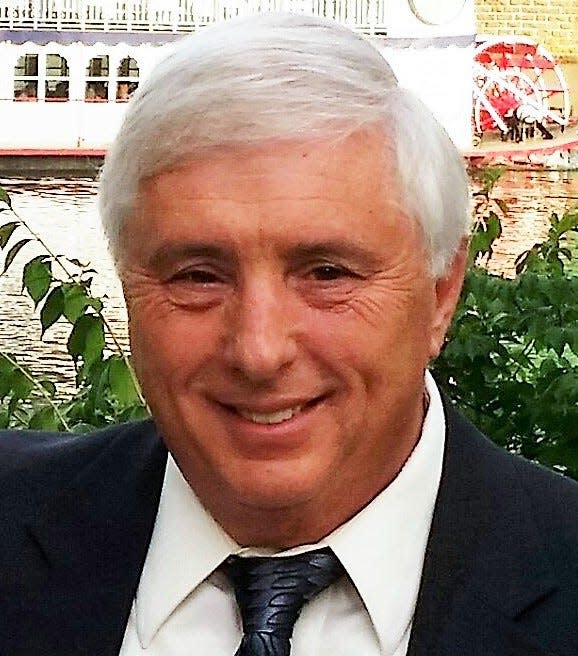Asking UT’s Critical Race Collective questions is a race to nowhere | Opinion
“It is better to debate a question without settling it than to settle a question without debating it.” — Joseph Joubert, French writer and philosopher.
Trying to get answers from the leaders of the University of Tennessee’s Critical Race Collective about the Critical Race Collective is, to put it critically, a race to nowhere.

Critical race theory, commonly called CRT, is nationally contentious, much-discussed, much-debated, much-opposed and much-supported, perhaps principally by people on either side who don’t know much about CRT. Instead, what they know is that they support or oppose anything supported or opposed by their political opposites.
Typically, Americans are told that “dialogue” is necessary to understand another person’s viewpoint on an issue. However, for some Americans it seems that on a number of issues — global warming, the Jan. 6, 2021, U.S. Capitol riots, or CRT, to name a few — dialogue is an enemy. Apart from absolute agreement, discussion is rejected.

The Critical Race Collective, is described on its university website as “collection of researchers, teachers, and scholars who strive to bring a critical race theoretical perspective to the University of Tennessee.” UT’s communications office says that the CRC is a Community of Scholars group, “launched by the Office of Research and Engagement as a way to encourage the growth of research affinity groups that cross disciplinary boundaries.”
Hear more Tennessee voices: Get the weekly opinion newsletter for insightful and thought-provoking columns.
Questions first submitted in May 2021 to CRC officials went unanswered. No response was received on the latest set of questions, sent Feb. 2, 2022. In a follow-up phone call with a CRC official, it was made clear that answers would not be forthcoming.
This state of affairs on a college campus seems odd, given that UT is an academic institution, the Critical Race Collective’s members are academicians, and it is an entity within the College of Arts and Sciences, which says its mission is to “promote intellectual inquiry and effective civic engagement …”

Tenets the CRC follows
The CRC says that its members “adhere to the five central tenets of Critical Race Theory, which include the following:
1. “Centrality of Race and Racism in Society: CRT asserts that racism is a central component of American life.

2. “Challenge to Dominant Ideology: CRT challenges the claims of neutrality, objectivity, colorblindness and meritocracy in society.
3. “Centrality of Experiential Knowledge: CRT asserts that the experiential knowledge of people of color is appropriate, legitimate and an integral part to analyzing and understanding racial inequality.
4. “Interdisciplinary Perspective: CRT challenges ahistoricism and the unidisciplinary focuses of most analyses and insists that race and racism be placed in both a contemporary and historical context using interdisciplinary methods.
5. “Commitment to Social Justice: CRT is a framework that is committed to a social justice agenda to eliminate all forms of subordination of people.”
Given the CRC’s existence within a major university, and its position with respect to CRT, it seems it would be open to taking questions. However, it’s not.

Your state. Your stories. Support more reporting like this.
A subscription gives you unlimited access to stories across Tennessee that make a difference in your life and the lives of those around you. Click here to become a subscriber.
Questions for the CRC

Here is the list of the Feb. 2, 2022, questions sent to the CRC:
1. With respect to tenet No. 2, would you please define meritocracy in society?
2. Tenet No. 2: please define the word “challenges” in this context. Does it mean rejects, or does it mean the tenet itself is open to being challenged?
3. Do you agree, or disagree, that tenet No. 2 could intimidate students or faculty members from expressing personal or collective expressions of neutrality, objectivity, colorblindness or meritocracy in society?
4. With respect to tenet No. 5, would a student or faculty member who disagrees that CRT is such a framework be by definition a racist, or at least racially insensitive, in the view of the CRC?
5. Is there any concern, or to what degree is there a concern, that students in classes of CRC-member faculty might legitimately be concerned about voicing non-agreement or opposition to CRT?
6. What is the value of CRC to the population of students and faculty at UT?
7. Does the CRC consider UT to be engaged in “institutional/structural racism,” and if so, where, and by whom?

8. What are the CRC’s plans for future symposiums, meetings and “social justice activism,” as the CRC defines the term?
Sign up for our newsletter: Read compelling columns by Black writers from across Tennessee.
Reporters covering elected officials will sometimes joke about being told by a political spokesman before a news conference that “We will take only positive questions.” In academic life, answering questions deemed positive or negative goes with the territory. Or should.

THE LATEST NEWS RIGHT AT YOUR FINGERTIPS
Get the latest local news, sports scores and more directly on your phone. Download the free Knox News mobile app.
The CRC website lists 37 affiliated faculty members. If any would like to take a shot at answering these questions, please do. You’re affiliated with the CRC for a reason. Why, and how does it affect your engagement with students? Get in touch with me and let’s talk.
George Korda is a political analyst for WATE-TV, hosts “State Your Case” from noon to 2 p.m. Sundays on WOKI-FM Newstalk 98.7 and is president of Korda Communications, a public relations and communications consulting firm.
This article originally appeared on Knoxville News Sentinel: Asking University of Tennessee’s Critical Race Collective questions

